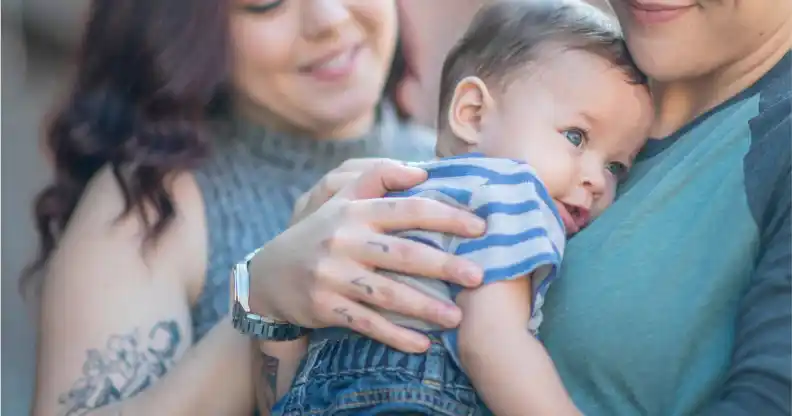Children of British-EU same-sex couples born overseas are being left ‘stateless’

Children born to same-sex parents are being left without citizenship. (Stock image via Getty)
Children born outside the UK to British and European parents in same-sex relationships are being left in “limbo” without any form of citizenship.
British citizens who were born abroad, who have same-sex spouses from EU countries, told the Guardian that if their child is also born outside of the UK, they are not eligible for British citizenship.
If the non-British parent comes from a country that does not recognise same-sex parents, couples have reported that their child is unable to get identity documents or passports from either country, leaving them “in limbo”.
The Guardian explored the case of a three-year-old girl named Sara, born in Spain to a British and a Bulgarian mother. The newspaper explained that the child’s British mother, Jane, was born in Gibraltar but moved to the UK when she was two weeks old, and as such cannot pass her British citizenship on to her daughter.
While the UK Home Office has refused to issue the three-year-old with a passport, she also struggled with acquiring Bulgarian citizenship, as the country does not recognise same-sex parents. Court documents noted that the current model of birth certificates in Bulgaria only has one box for “mother” and another for “father”, and “only one name may appear in each box”.
In December 2021, the Court of Justice of the European Union (CJEU) ruled that Bulgaria must issue identity papers to a child of same-sex parents, and that all EU nations must respect such families.
The court added that Bulgaria must recognise the Spanish birth certificate that was issued to Sara, which lists both her mothers as her parents, but does not need to issue a Bulgarian birth certificate.
The Guardian explained that the family had a final hearing on the case in November, and is now waiting for a decision from Bulgarian courts on whether the government will comply with the CJEU’s ruling.
Jane told the newspaper: “It is hard to watch our friends with young children travel and visit family and friends in other countries when we know we can’t.
“We have relatives who are elderly who have not yet met Sara – and we fear that, if we aren’t able to travel with her soon, they never will. The thought of that is so heartbreaking.”
On 7 December, the European Commission released a proposal stating that parenthood established in an EU member state should be recognised in all the other member states; this means that countries that do not recognise same-sex parents would have to accept a child like Sara, born in a country which does acknowledge same-sex parenthood.
Didier Reynders, EU commissioner for justice, said in a statement: “All children should have the same rights irrespective of how they were conceived or born and of their type of family.
“Today’s proposal aims to guarantee that the fundamental rights of children are not put at risk in cross-border situations within the European Union.
“Thanks to the new rules, all children and families would enjoy the rights derived from parenthood under national law in all the Member States, once their parenthood has been established in one Member State.”
ILGA-Europe added in a tweet: “Ensuring that children have their parents fully recognised when moving across the EU is an essential condition for their best interests and their fundamental rights.
“We welcome this proposed law that will reduce serious problems that rainbow families face when moving in the EU.”
PinkNews has contacted the Home Office for comment.

